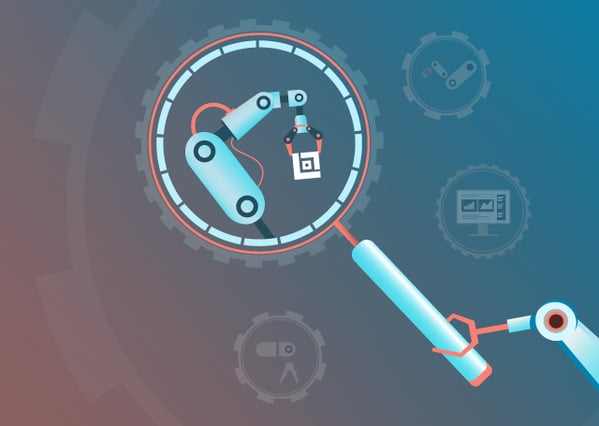
Automating repetitive tasks has revolutionized almost every industry by allowing workers to focus on high-value projects. For businesses that process massive amounts of documents, it is especially important to automate repetitive tasks. The financial industry deals with complex and large amounts of data hence accuracy and error-free operations are crucial requirements. Any mistake in calculation or error in operation can cost a huge amount. Thus, the call for a technology solution that can minimize human errors and deliver precise results is the need of the hour.
The RPA market is evolving rapidly and showing promising results. RPA implementation is effectively reducing errors nearly by 50% and increasing the accuracy of financial operations by 75%. These applications automate business operations, data collection, rule-based processes, and other higher-value work. This helps to free up the accounting staff's time and they can devote more time to customer service and reduce overall costs.
Benefits of RPA in Finance
With RPA, testers can implement end-to-end intelligent automation using specialized software robots for carrying out critical and repetitive business processes without any human effort. The few benefits of RPA in finance and computing are as follows:
-
More Accuracy and Efficiency
It assists to complete repetitive tasks with greater accuracy, which helps teams to focus on other priorities. RPA bots can be customized to handle immense quantities of data and deliver within defined time intervals. RPA integration with any existing manual task/process can drastically expedite the task that was prolonged due to manual testing interventions. RPA robots are doing value addition in various areas of financial institutions such as credit card processing, IT issue resolution, fraud detection, training, HR onboarding/staffing, audit validation, and credit, and identification checks.
-
Enhanced Customer Experience
In today’s automated world, customers demand service 24/7. RPA bots can provide 24/7 real-time services like processing customer queries, collecting customer feedback, basic transactions for mobile and online banking, scheduling, and managing payments. RPA robots can help to reduce wait time on approvals, claims payouts, and feedback on queries.
-
Enhanced Compliance and Audit Reporting
Meeting customers' consent and auditing are crucial parts of financial institutions. Financial institutes allocate numerous resources to non-compliance fines and lawsuits. Other than this there is additional cost and resources that financial institutions spend to ensure compliance within the company. RPA is an efficient solution to control compliance costs and minimize risk by automating all compliance-related processes.
-
Seamless Usability
RPA is a very flexible intelligent automation solution that can be integrated with any existing technology. Business process management (BPM) and RPA platforms are built for change and agility, so they are highly flexible.
-
Automate Data
Robotic Process Automation (RPA) can automate unstructured data like an invoice from emails, images, reports, and text files. Data extraction can help you with that.
-
RPA Use Cases in Finance
Business processes of Finance and accounting institutions are very complex and long. For example, to originate a loan for a customer a bank employee needs to execute a process from collecting customer details, then verifying the income details and credit reports. RPA can easily save time on data collection and data verification by extracting data directly from other systems (like credit bureaus) and then transferring data into bank systems. This also enables us to reduce costs, turnaround times, and manual mistakes.
Here are the top 11 use cases of RPA in the finance industry:
-
Customer onboarding
As we know that KYC is an important part of customer onboarding. Financial institutions spend a good amount of time collecting information rather than managing the account. RPA is efficiently solving this issue by automating the data collection process. By using Optical Character Recognition (OCR ), RPA can feed the physical documents and convert them to digital documents and then arrange them into a report. Reporting supervisor then can review the report generated by the RPA solution and can make decisions of approval or rejection. After getting a supervisor's decision (a predefined trigger), the RPA bots directly feed the data into the customer profile for final creation.
-
Data Recording
This is one of the best use cases of RPA in finance. Data collection and entering the data into the system is a very time-consuming task. Chances of human errors are also very high here which can result in losing huge sums of money for the companies. Here, RPA helps to record error-free data with complete accuracy. Financial transactions require lots of manual reviews. With the RPA platform companies are recording each transaction according to the transaction type in different sheets. This way helps to eliminate the manual review process and saves a lot of money.
-
Invoice Management
Invoices are an integral part of every financial institution for their day-to-day operations. Manual invoice processing takes around 2 weeks or more as all the processes require manual efforts. Robotic process automation in finance automates invoice management. RPA bots collect data, process receipts, and send invoices to vendors in just a few minutes. RPA bots are available 24X7 so invoice management can be done any time as soon as it receives a receipt.
-
Investment Management
In the investment management space, RPA implementation is in its very initial stage. RPA system cannot directly provide suggestions for investment though it acts as a support system for wealth management. For price evaluation, RPA solutions provide real-time pricing comparison between stocks and mutual funds, and customers can choose the best option from them. In addition to that, RPA can monitor the customer portfolio and can notify the customer of any fluctuations.
-
Financial Planning
Forecasting and financial planning are very challenging tasks for accountants. RPA helps to simplify cost planning and budgeting in a short period. RPA in finance and accounting use a data set to forecast results. Due to these predictions results become easier as RPA systems use internal and external system data in the predictive system, which helps in making informed decisions.
-
Preventing Manual Error
Financial institutions invest a good amount of money to train their workforce. This is because a small error can cause them millions of dollars in losses. Even after completing training due to the nature of the job (accounting and calculations), there is always room for error. RPA solution helps with error-free accounting solutions.
-
Purchase Order Processing
RPA can automate purchase order processing and can reduce human errors. OCR can read the paper document and with the help of machine learning, data can be mapped to the exact system records. RPA can generate the PO and then submit it for further approval.
-
Anti-money Laundering (AML)
Some recent studies state that anti-money laundering analysts spend only 10-15% of their time on analysis. The majority of their time goes into data collection, data entry, and organization. This investigation process is highly manual and takes on average 30-40 minutes for a single case further this time varies depending upon the complexity and availability of data available. RPA can automate the complete AML investigation process to a great extent by automating repetitive and rules-based tasks.
-
Credit Card Application Processing
Implementation of RPA in credit card processing has given phenomenal results to banking institutions. RPA bots can interact with multiple systems which allows them to collect customer data, data processing, and background verification from integrated 3rd party systems. This helps to issue customer credit cards within a few hours.
-
Account Closure Processing
The account closure process involves a range of manual tasks like sending emails to customers and branch managers, getting customer feedback, checking documents in the bank’s records, and data processing in the system. RPA bots can efficiently automate these manual tasks and can eliminate manual efforts completely.
-
RPA for Mortgage Processing
This is one of the prominent use cases of RPA in finance. Closing a mortgage loan is a lengthy process and takes up to 60 days. Loan officers need to perform many steps like identification and address verification, employment verification, credit bureau check, and asset assessments. Any error in this verification process brings down the processing time of the respective case. RPA is a great problem solver here. RPA can cut down the loan application processing time by nearly 80% which makes the overall loan origination process super-efficient.
-
Conclusion
RPA is the solution to the complex and growing operations of financial companies. RPA bots automate financial transactions and repetitive finance operations to a great extent which helps organizations to focus on direct profit-generating activities. QASource is a leading software testing company that delivers complete RPA automation, artificial intelligence, and machine learning testing solutions in the finance and accounting industry. Get started with RPA tools today and increase your efficiency by 50%. Partner with QASource to deploy cutting-edge software testing services for your software business.



